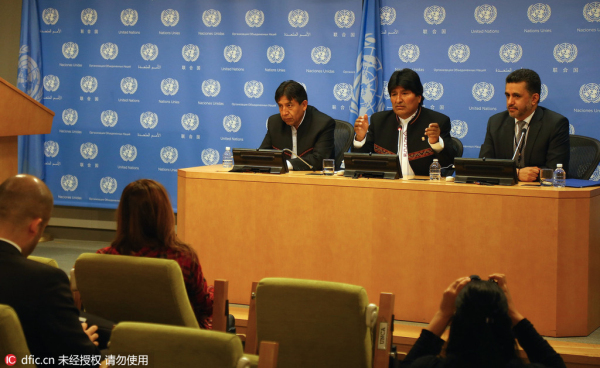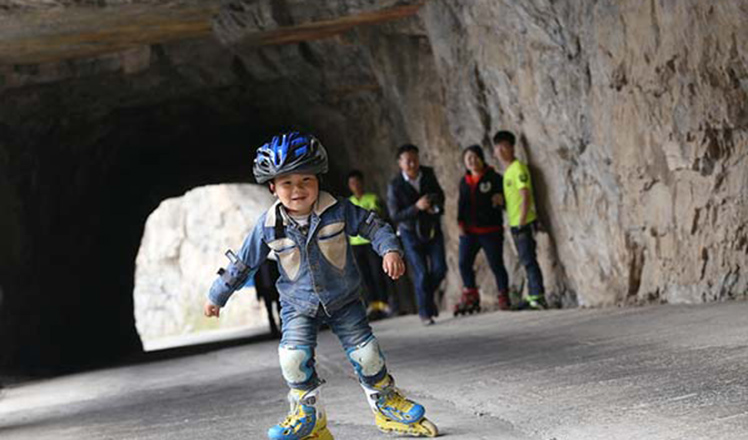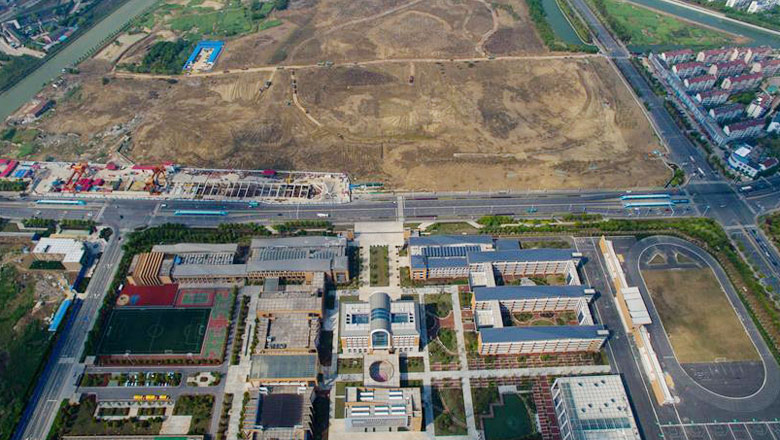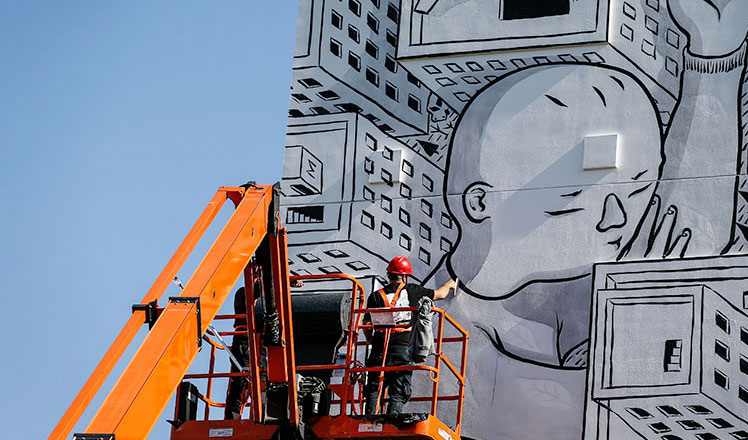Pact holds out promise of climate-friendly future
Updated: 2016-04-22 07:19
(China Daily)
|
||||||||
 |
|
President of Bolivia Evo Morales is seen talking at the United Nations Headquarters during the Paris Climate Agreement Signing Ceremony, in New York, on April 21 2016.[Photo/IC] |
The signing of the Paris Agreement on Climate Change by world leaders in the UN headquarters in New York on Friday will be a milestone in global joint efforts to combat the common threat faced by mankind.
The agreement, which was reached in the French capital in December 2015, sets the target of holding the global average temperature rise below 2 C as compared with the pre-industrial level. It promises a climate-friendly future may yet be achieved.
We have only one Earth and the threats we face from climate change are real. It is the common responsibility of all nations to ensure future generations do not suffer the consequences because of this generation's inaction.
The implementation of the agreement will be a long and hard process and many uncertainties remain. The failure of the developed nations to provide promised funds and technologies to help underdeveloped ones adapt to global warming is compromising the collective endeavor.
China, as the largest developing country, played an exemplary role in securing the agreement and it is tackling climate change by setting self-imposed emission targets that will see its carbon emissions peak by 2030 or earlier. It has also promised to cut its carbon intensity-carbon dioxide emissions per unit of GDP-by up to 65 percent by 2030 compared with 2005 levels.
To achieve these goals, China has taken a series of steps to promote green energy and cut the use of coal, which is blamed for up to 80 percent of carbon emissions. The share of non-fossil sources in the country's primary energy mix will rise to 20 percent by 2030, from 12 percent in 2015.
Now more than a quarter of the world's sustainable energy capacity such as solar, wind and nuclear power is installed in China, making it a world leader in the fight against global warming.
This has not come easily. China's economic growth, at 6.9 percent last year, is already its slowest in more than two decades. The economy faces growing pressure as more excessive industrial capacity is shed, especially in the steel and coal sectors, which will lay off millions of workers.
With its signing of the Paris Agreement, China is showing it is committed to seeking low-carbon growth and promoting innovation and ecology-friendly industries for a sustainable future for itself and the world.
- As country's population has grown, so has the level of higher education
- Charities rebuild image through relief efforts
- New hiv testing project targets groups most at risk
- Study finds 20-year slump in exercise
- Little champ: Four-year-old roller skates on cliff
- Chinese scientists figure out Zika virus NS1 protein structure
- Ecuador continues recovery efforts following powerful quake
- Beacons and gun salutes as Britain's Queen Elizabeth turns 90
- Queen Elizabeth II's China connections
- Portraits of Queen Elizabeth released to mark her 90th brithday
- Big celebration set for queen's 90th birthday
- Things to know about Queen Elizabeth II
 A 75-year-old kite runner in west China's Shannxi
A 75-year-old kite runner in west China's Shannxi
 $2 million hyper car crash in east China's Zhejiang province
$2 million hyper car crash in east China's Zhejiang province
 Little champ: Four-year-old roller skates on cliff
Little champ: Four-year-old roller skates on cliff
 In pics: Day in the life of a webcasting anchor
In pics: Day in the life of a webcasting anchor
 Top 10 Chinese cities with highest average salaries
Top 10 Chinese cities with highest average salaries
 School 'poisoned' by chemical plants in East China
School 'poisoned' by chemical plants in East China
 Muralist Millo adds color to Shanghai's skyline
Muralist Millo adds color to Shanghai's skyline
 Maze-like bookstore opens new branch in Hangzhou
Maze-like bookstore opens new branch in Hangzhou
Most Viewed
Editor's Picks

|

|

|

|

|

|
Today's Top News
Liang avoids jail in shooting death
China's finance minister addresses ratings downgrade
Duke alumni visit Chinese Embassy
Marriott unlikely to top Anbang offer for Starwood: Observers
Chinese biopharma debuts on Nasdaq
What ends Jeb Bush's White House hopes
Investigation for Nicolas's campaign
Will US-ASEAN meeting be good for region?
US Weekly

|

|







